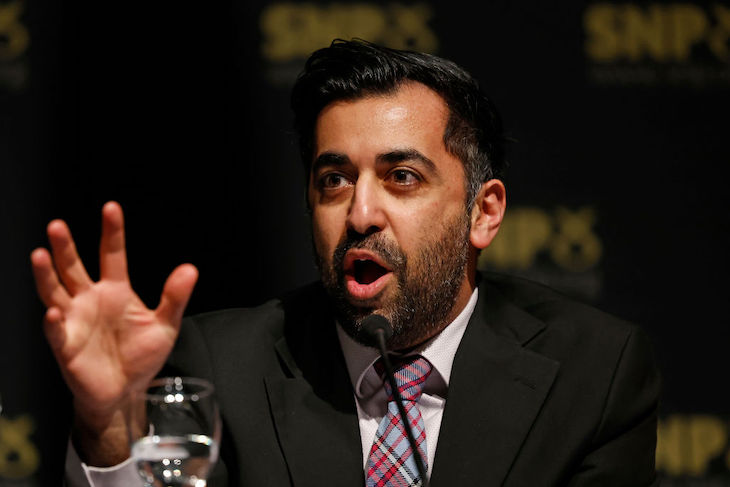A word of advice for anyone with ambitions to hold high political office: if you think you might ever need the assistance of your opponents, don’t allow your party to repeatedly abuse them. This wisdom comes too late for it to be of use to Scotland’s First Minister, Humza Yousaf, who has accepted the inevitable and announced his resignation this afternoon.
Yousaf’s attempts to build bridges failed
Fighting for his career after his decision to tear up the Holyrood power-sharing deal between the SNP and the Scottish Greens blew up in his face, the First Minister spent the weekend reaching out across party lines. His aim was to see off a vote of no confidence, tabled by the Scottish Tories and loudly supported by opposition parties, including those Greens. Unsurprisingly, Yousaf’s attempts to build bridges failed. His opponents’ glee at his misery, however, tells a deeper story about the state of Scottish politics.
‘We might have been a bit more inclined to cooperate with him,’ says one Labour member of the Scottish parliament, ‘if the SNP hadn’t spent the past 20 years telling voters we were all kinds of pieces of rubbish.’
That, I’m afraid, is an entirely accurate description of the SNP’s conduct over a long period. It is never enough for the Scottish nationalists to defeat their opponents, they have to demonise them, too, going out of their way to foment anger against anyone who dares question the wisdom of their separatist plans.
Yousaf’s predecessor, Nicola Sturgeon, famously said she ‘detested’ Tories, while Yousaf has recently been talking about how Conservatives might be driven out of Scotland. Meanwhile, the Nats have caricatured Labour as a pro-Brexit right-wing party, no more than ‘red Tories’.
The hateful, deliberately divisive language of senior nationalist politicians has consequences. I have never witnessed supporters of the UK protest outside an SNP conference, jostling and even spitting on delegates. On the other hand, it is to be expected that angry nationalist mobs will picket meetings of the Scottish Conservative and Labour parties with the intention of intimidating attendees.
When Yousaf – under pressure from moderates in his party concerned about the unwillingness of Green MSPs to accept Dr Hilary Cass’s review of NHS treatment of gender-confused young people as a valid scientific document – ditched the SNP’s junior partners last Thursday, he lost his government’s parliamentary majority.
Almost immediately, the Tories’ lodged their no confidence motion, illustrating the danger of that new reality. Devastatingly for Yousaf, the co-leaders of the Scottish Greens, Patrick Harvie and Lorna Slater – furious about being dumped from their ministerial posts – swiftly declared their party would back the Conservatives’ call.
Of the Scottish parliament’s 129 MSPs, 63 represent the SNP. In order to have defeated a vote of no confidence, Yousaf would have required the support of at least one opposition member. That would have created a 64-64 deadlock and the parliament’s 129th member, the Presiding Officer Alison Johnstone, would have been obliged to vote in favour of the status quo.
Though the result of a vote on Yousaf’s First Ministership would not have been binding, defeat would have been unsurvivable. Simply, had he lost and refused to step down, a Labour motion of no confidence in his government – which would have required his resignation – would have followed and would have done for him.
Yousaf might have been able to cling on if he’d been able to agree an accommodation with former SNP MSP Ash Regan, now the sole representative at Holyrood of Alex Salmond’s Alba Party.
Regan – who defected to Alba shortly after coming third behind Yousaf and former finance secretary Kate Forbes in last year’s contest to succeed Sturgeon – had offered her backing in return for concessions. These included a declared new focus on independence, the acceptance of all aspects of the Cass review, and the agreement of an electoral pact so that only one pro-independence candidate stood in certain constituencies (a deal that would have smoothed Salmond’s return to Holyrood).
But the idea of Yousaf dealing with Alba was always a non-starter. Simply, it would have been absolutely intolerable for a number of his senior colleagues.
The idea of Yousaf dealing with Alba was always a non-starter
It’s a while since Salmond was considered a hero by SNP members. A long period taking the Kremlin’s Ruble as a presenter on Russian propaganda channel RT is, quite rightly, unforgivable for many.
And a high profile court case in 2020, which ended in Salmond being cleared of a number of sex offences, further damaged his reputation. He walked free from court after his QC Gordon Jackson argued that his client could have been a ‘better man’. Jackson was later overheard on a train describing Salmond as ‘an objectionable bully’, ‘a nasty person to work for’, and ‘an arsehole’.
‘There was never any way,’ says one SNP parliamentarian, ‘that he could have done a deal with Ash Regan. Salmond’s been all over the TV, gloating at the whole mess. He was never interested in helping Humza, he just wanted to torment him. If Humza had done a deal with Alba, he’d have needed more supporters to make up for the SNP cabinet secretaries who’d have backed the no confidence vote.’
We now await news of which MSPs might fancy their chances of winning the right to lead the SNP to humiliation in the coming general election. To whoever ends up with the crown, might I humbly suggest they try to get through their victory speech without describing their opponents as the scum of the Earth.
Lucy Dunn, Katy Balls and Iain Macwhirter discuss what happened to Humza Yousaf on SpectatorTV:







Comments